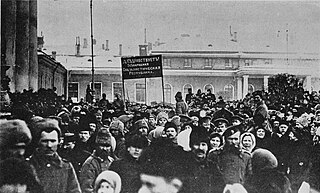
The October Revolution, known in Soviet historiography as the Great October Socialist Revolution, was a revolution in Russia led by the Bolshevik Party of Vladimir Lenin that was a key moment in the larger Russian Revolution of 1917–1923. It was the second revolutionary change of government in Russia in 1917. It took place through an armed insurrection in Petrograd on 7 November 1917 [O.S. 25 October]. It was the precipitating event of the Russian Civil War.

The Russian Civil War was a multi-party civil war in the former Russian Empire sparked by the overthrowing of the social-democratic Russian Provisional Government in the October Revolution, as many factions vied to determine Russia's political future. It resulted in the formation of the Russian Socialist Federative Soviet Republic and later the Union of Soviet Socialist Republics in most of its territory. Its finale marked the end of the Russian Revolution, which was one of the key events of the 20th century.

The German Revolution of 1918–1919 or November Revolution took place in Germany at the end of the First World War. It began with the downfall of the German Empire and eventually resulted in the establishment of the Weimar Republic. The revolutionary period lasted from November 1918 until the adoption of the Weimar Constitution in August 1919. Among the factors leading to the revolution were the extreme burdens suffered by the German population during the four years of war, the economic and psychological impacts of the German Empire's defeat by the Allies, and growing social tensions between the general population and the aristocratic and bourgeois elite.
The Russian Revolution was a series of uprisings that led to the fall of the Russian Empire, the end of Russian involvement in the First World War (1914-1918), the Russian Civil War (1917-1923), and the establishment of the Union of Soviet Socialist Republics (USSR).
Polish Resistance may refer to:

The following is the list of official public holidays recognized by the Government of Russia. On these days, government offices, embassies and some shops, are closed. If the date of observance falls on a weekend, the following Monday will be a day off in lieu of the holiday.
March Revolution may refer to:
The October Revolution, or "Red October", was a revolution in Russia led by the Bolsheviks in 1917.

Radasłaŭ Kazimiravič Astroŭski was a Byelorussian collaborator with Nazi Germany who served as president of the Belarusian Central Council, a puppet Belarusian administration under German hegemony from 1943–1944, and in exile from 1948-1976.

Vladimir Alexandrovich Antonov-Ovseenko, real surname Ovseenko, party aliases 'Bayonet' (Штык) and 'Nikita' (Ники́та), literary pseudonym A. Gal, was a prominent Bolshevik leader, Soviet statesman, military commander, and diplomat.
January Uprising may refer to one of the following:
Ukrainian Revolution may refer to:

The Ukrainian War of Independence, also referred to as the Ukrainian–Soviet War in post-Soviet Ukraine, lasted from March 1917 to November 1921. It saw the establishment and development of an independent Ukrainian republic, most of which was absorbed into the Soviet Union as the Ukrainian Soviet Socialist Republic of 1922–1991.

The Volinsky Lifeguard Regiment, more correctly translated as the Volhynian Life-Guards Regiment, was a Russian Imperial Guard infantry regiment. Created out of a single battalion of Finnish Guard Regiment in 1817, the regiment took part in the Polish-Russian War of 1830–1831, the Crimean War, the January Uprising of 1863 and the First World War.
The French Revolution was a period of social radial and political society in France from 1789 to 1799, including the creation of a constitutional monarchy, the Reign of Terror, execution of Louis XVI and the proclamation of the French First Republic.
White Terror may refer to:
In many periodizations of human history, the late modern period followed the early modern period. It began approximately around the year 1800 and depending on the author, either ended with the beginning of contemporary history after World War II in 1945, or includes the contemporary history period up to the present day. Notable historical events in the late 18th century that marked the transition from the early modern period to the late modern period include – the American Revolution (1765–1791), the French Revolution (1789–1799), and the beginning of the Industrial Revolution around 1760.

The Revolutions of 1917–1923 were a revolutionary wave that included political unrest and armed revolts around the world inspired by the success of the Russian Revolution and the disorder created by the aftermath of World War I. The uprisings were mainly socialist or anti-colonial in nature. Some socialist revolts failed to create lasting socialist states. The revolutions had lasting effects in shaping the future European political landscape, with for example the collapse of the German Empire and the dissolution of Austria-Hungary.

The February Revolution, known in Soviet historiography as the February Bourgeois Democratic Revolution and sometimes as the March Revolution, was the first of two revolutions which took place in Russia in 1917.
Spanish Revolution may refer to:
This page is based on this
Wikipedia article Text is available under the
CC BY-SA 4.0 license; additional terms may apply.
Images, videos and audio are available under their respective licenses.









